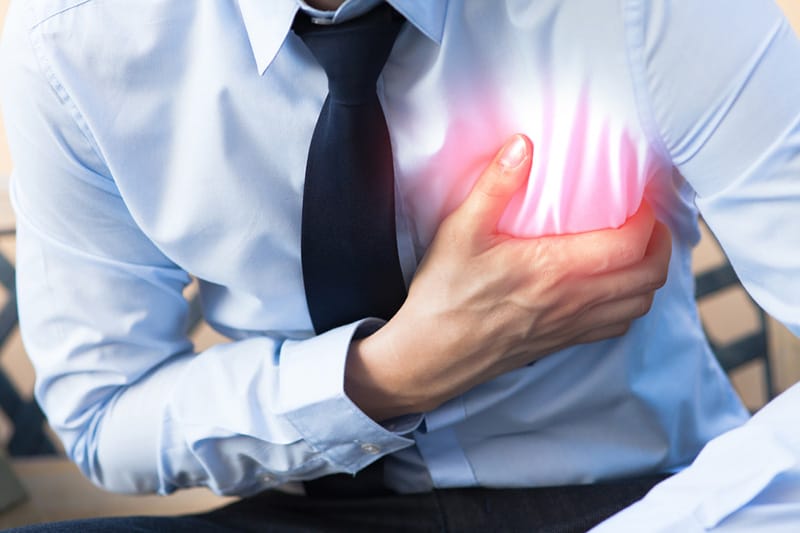A man clutches his heart and falls to the ground. You know immediately he’s having a heart attack.
But there are two problems with this scene. The signs of most heart attacks aren’t so clear. And more women than men die of heart disease each year.
A chest-clutching collapse is a clear warning sign — just not one you’ll typically see with men or women. One in five heart attacks is silent, meaning it happens without showing any signs. And the other common heart attack symptoms aren’t so easily identifiable.
You need to know these five major signs of a heart attack.
Heart attacks can happen slowly or suddenly and in varying degrees of intensity. Most of them actually start slowly with mild symptoms that gradually worsen. Everyone experiences symptoms differently but there are five warning signs that both men and women commonly experience. If you can spot them early, you can limit the damage from the heart attack.
1. Chest Pain or Discomfort
Chest pain is the most common sign of heart problems. It’s close to your heart, so it’s the clearest sign, too. You don’t always feel pain. It might feel like uncomfortable pressure, fullness, squeezing, tightness, burning or tingling. The feeling typically lasts longer than a few minutes.
2. Arm and Shoulder Pain or Discomfort
The pain in your heart and chest can quickly travel elsewhere, most commonly to the arms and shoulders. Men most often feel pain in their left arm, but you can have symptoms on either side of the body.
3. Shortness of Breath
Pressure and pain in your chest will likely make it harder to breathe. But during a heart attack, you can have shortness of breath without ever feeling any level of chest discomfort. If your heart is struggling to pump blood, it’s not delivering oxygen to the lungs, causing your breathing problems.
4. Weakness or Lightheadedness
The lack of oxygen doesn’t just affect your lungs. You can quickly feel faint, unsteady, lightheaded or weak. When your heart is not pumping as it should, your blood pressure drops suddenly, causing this feeling.
5. Jaw, Neck and Back Pain or Discomfort
After the arms and shoulders, the rest of your upper body is the likeliest destination for the pain to travel. As a lone symptom, pain in the jaw, neck or back is probably something else. But if you experienced some pain or mild discomfort in the chest, arms or shoulders first, it’s a sign you’ve been having a heart attack that whole time.
But men and women also have different heart attack symptoms.
Nausea, vomiting, heart palpitations and stomach discomfort are symptoms outside the top five that men and women may experience. But the similarities stop there.
Men are much more likely to show the most common symptoms and experience them suddenly and with more severity. In addition to those, they can have cold sweats, dizziness or a feeling that they’re going to pass out. Men also hit heart attack age earlier than women. A man’s risk for heart attack increases significantly after the age of 45, five years earlier than women.
The heart attack signs for women are more subtle. For that reason, women are at a much higher risk to have a silent heart attack and be unaware that it’s happening or confuse it with something else.
Studies have shown that women who have had a heart attack often did not experience chest pain — the most telling sign of a heart problem. Instead, women have a set of symptoms that come on slowly and progress gradually, including:
- Unusual fatigue
- Sleep disturbance
- Flu-like discomfort
- Paleness or clammy skin
- Inability to sleep
Unlike men, whose symptoms typically come in a matter of minutes, women may experience symptoms for as long as a month before a heart attack occurs. That’s why it’s so important for them to recognize these less intense symptoms and talk to a doctor.
Call 9-1-1 if you see the signs of a heart attack.
The faster you can get help, the better. Without oxygen, your heart and other organs will die. So it’s essential that everyone understands the warning signs and the differences in symptoms between genders.
If you see any signs of a heart attack — sudden or slow, subtle or intense — get emergency medical help right away. Catching a heart attack early is your best shot saving a life.
It might even be your own.
